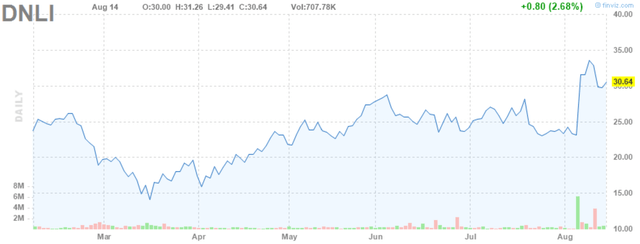Denali Therapeutics (NASDAQ:DNLI) has been on my radar for a while due to my personal interest in companies researching longevity-related areas like neurodegeneration. I hadn’t yet taken a close look, though, until I saw the Biogen (BIIB) partnership announcement recently. In this article, I take a deep dive into the Biogen partnership and the underlying LRRK2 inhibitor program, provide some background on the rest of the company’s pipeline, and try to assess whether Denali presents a good risk/reward profile at this time.
Denali’s Partnership With Biogen Should Go A Long Way In Helping Denali Get Products To Market
On August 6, Denali announced that it had reached a deal with Biogen to jointly develop and, if successful, commercialize its Parkinson’s disease platform of leucine-rich repeat kinase 2 inhibitors (LRRK2). In addition to the LRRK2 component of the deal, Denali is also giving Biogen the right to opt into two additional, undisclosed developmental programs and a right of first negotiation for two more, also undisclosed, programs. All we really know about these indications is that they are all in neurodegenerative diseases and make use of Denali’s proprietary technology platform that ensures its therapies make it across the blood-brain barrier.
In exchange for what Biogen is receiving under the terms of the deal, it agreed to pay Denali $560 million in upfront cash and to make a $465 million equity investment in Denali. Significantly, this equity investment was at a price of $34.94 per share, far above the range Denali had been previously trading in.
Figure 1: Denali Stock Chart (source: finviz)
Biogen now owns about 11% of Denali’s outstanding stock. Denali also stands to make up to $1.125 billion more in potential developmental and commercial milestone payments. For the LRRK2 program, Biogen agreed to bear 60% of the global developmental costs, but the companies will equally split any
